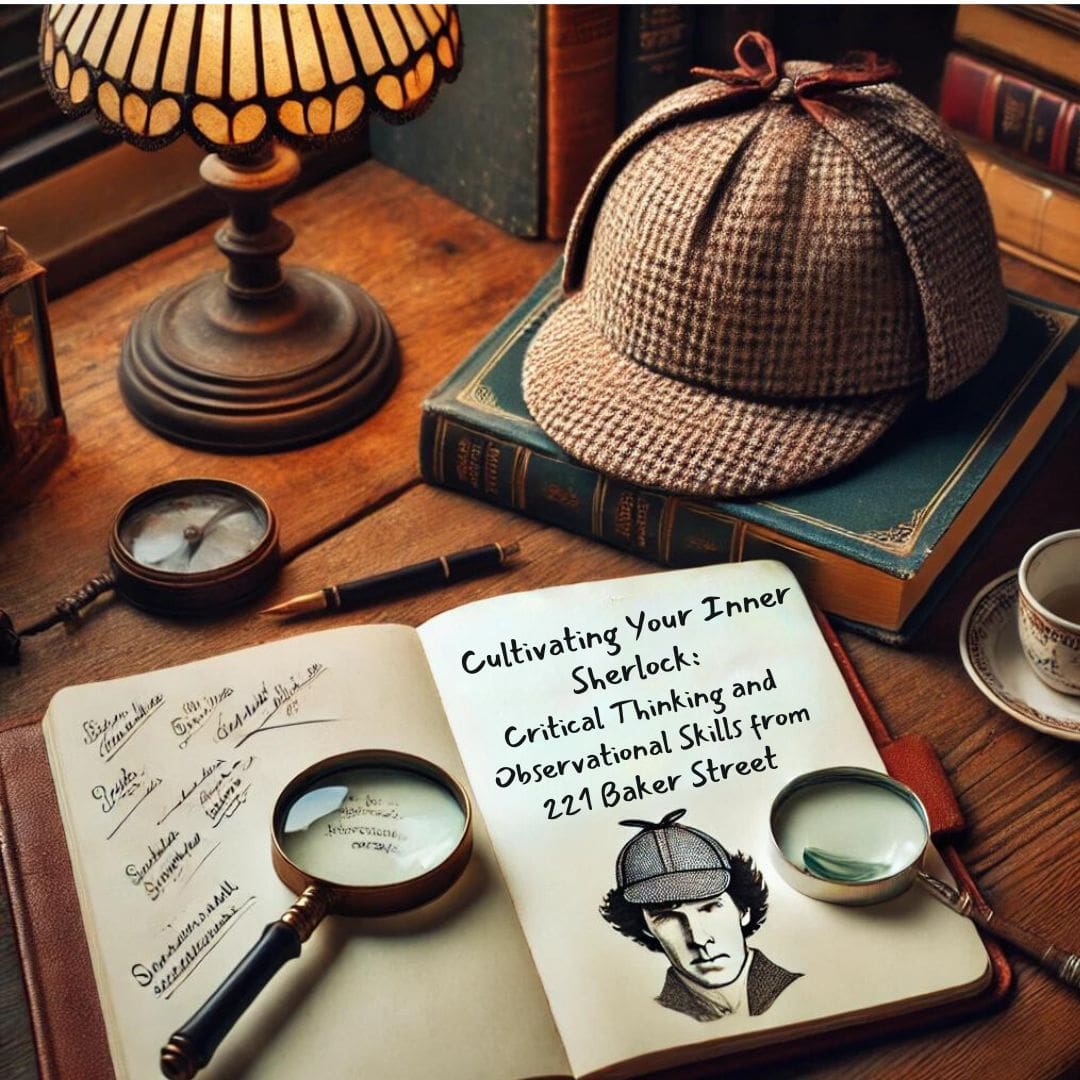Unleashing Your Inner Detective: Why We All Need a Bit of Sherlock in Our Lives
Step 1: Embrace Your Inner ‘Sherlockness’
Let’s start by accepting that we all have a bit of Sherlock Holmes tucked away inside us. Yes, even you! It might be hidden under your pile of unread self-help books or squished between the couch cushions, but it’s there. So dust off those deductive reasoning skills and let them shine.
Step 2: Don The Detective Hat
Now imagine yourself in one of Sherlock’s iconic deerstalker hats (you know, the funky cap with two ear flaps). No need to actually buy one unless you’re really committed to this detective gig – then feel free to splurge on Amazon Prime for next day delivery!
Step 3: Get Curious – Really Curious
Channel your inner five-year-old who incessantly questioned why the sky is blue or why dogs can’t talk like humans. This curiosity will fuel your observational powers just like our dear Mr.Holmes.
Step 4: Master Observation Skills
Look closely at everything around you, not only with your eyes but also using all senses available as if they were superpowers (no radioactive spiders needed!). Learn how people behave when they are happy, sad, or nervous – their body language can tell more than words ever would.
Step 5: Deductive Reasoning Is Key
Time now for some mind gymnastics! Connect dots from what you observe and form conclusions based on logic rather than assumptions, because remember folks, “When making an assumption,” says Holmes himself ,”you make an ASS out of U & ME.”
Step6 : Be Wrong And Proud Of It
It’s okay if sometimes things don’t add up correctly despite trying hard enough (remember Moriarty?). What matters is learning from these mistakes, so that next time when someone tries pulling wool over our eyes we’d say,”Not today!”
So go ahead my budding Sherlocks– use these steps as guideposts towards cultivating critical thinking and observational skills. And remember, every great detective started somewhere – even Sherlock Holmes had to start with his first case! So unleash your inner sleuth and bring a bit of 221B Baker Street into your everyday life. After all, the game is always afoot!
Bumbling Through Baker Street: How to Not Be a Watson in Life’s Mysteries
Bumbling Through Baker Street: How to Not Be a Watson in Life’s Mysteries
Step 1: Don’t Play the Sidekick
The first step is to stop seeing yourself as the sidekick. Yes, we all love John Watson for his heart and loyalty, but let’s face it – he doesn’t always get Sherlock-level recognition. So how about upgrading your status from faithful follower to main character? Remember that you’re not just here for comic relief or dramatic gasps – you’ve got some sleuthing skills of your own.
Step 2: Embrace Your Inner Sleuth
Next up on our journey through Baker Street without tripping over our feet is embracing those innate detective abilities. You may think this involves donning a deerstalker hat and smoking pipe while ruminating in an armchair (and if so, more power to ya), but really it’s about being observant and curious.
Step 3: Master The Art Of Observation
Sherlock Holmes was never one for small talk; rather than asking Mrs Hudson about her day at work or what she thought of last night’s episode of Britain’s Got Talent, he would deduce these facts by observing subtle clues around him like crumbs on her blouse indicating she had lunch with someone who loves whole grain bread! Start noticing details others might miss – whether they’re physical traits, behavioral quirks or patterns within situations.
Step 4 : Deductive Reasoning Is Key
Your observational prowess won’t be much use unless paired with deductive reasoning skills sharp enough cut through life mysteries like butter slices through hot toast! It helps us make educated guesses based off observed data, instead blindly stumbling into conclusions which often leads us down rabbit holes filled with regretful decisions like chocolate cake binges or late-night infomercial purchases– nobody needs another Snuggie!
Step5 : Practice Makes Perfect
Lastly remember practice makes perfect. Even greats weren’t born with their genius. Sherlock Holmes didn’t wake up one day suddenly able deduce the number of sugar cubes someone takes in their tea. He honed his skills over time through practice and patience. So don’t be disheartened if you’re not solving life’s mysteries at a break-neck speed just yet – keep observing, keep deducting, and most importantly – keep going!
So there we have it folks! A step-by-step guide to stop bumbling through Baker Street like Watson in the throes of an existential crisis, like about whether jam or marmalade is superior for breakfast toast (it’s clearly marmalade). Remember that channeling your inner Sherlock isn’t about becoming superhuman; it’s simply about using what you already possess: curiosity, observation skills, and reasoning abilities. And who knows? Maybe with enough practice even Mrs. Hudson might start seeing crumbs on her blouse before they get there.

Sherlock’s School of Sleuthing: The Art of Deduction for the Everyday Human
Step 1: Don the Deerstalker
The first step to becoming an everyday Sherlock is, of course, to don your deerstalker hat. If you’re not sure what that is, it’s time for a quick Google search! This iconic headgear has become synonymous with our favorite detective and will instantly put you in the sleuthing spirit. But remember – wearing this hat does not automatically grant superhuman deduction skills (unfortunately). It merely sets the tone.
Step 2: Embrace Your Inner Introvert
Sherlock Holmes was famously introverted but fear not extroverts; his methods can still be learned by all personality types! The key here isn’t about shunning human contact entirely, but rather learning how to enjoy solitude so as to better focus on honing those observational skills without distractions.
Step 3: Master Observation
This one may seem obvious – after all, what kind of detective would we be if we didn’t observe? However, when I say ‘observe’, I’m talking about truly seeing things around us in minute detail. Try examining objects or people like they’re under a microscope. You’ll be amazed at how much more there is once you start really looking!
Step 4: Cultivate Curiosity
Curiosity might have killed the cat according to some old adage peddler out there somewhere…but let’s face facts- it made Sherlock one heck of a detective! So next time something piques your interest, instead of dismissing it because “it doesn’t concern me”, take some moments and indulge that curiosity.
Step 5 : Develop Deductive Reasoning Skills
Now comes perhaps most difficult part—deduction itself . We’ve been observing , cultivating curiosity, now its a high noon showdown against the world’s trickiest opponent —our own brains ! Here are few tips get started :
a) Question Everything
b) Look For Patterns
c) Make Informed Guesses
Step 6: Practice, practice, and more practice
Just like any other skill in the world – be it playing an instrument or perfecting a soufflé – becoming proficient at deduction requires constant practice. Start with small observations about people around you (like deducing their profession from their attire), then gradually move on to bigger things.
Step 7: Embrace Failure
You’re not going to get it right every time; even Sherlock didn’t! But each failure is just another opportunity for learning. So don’t let those missteps discourage you. Instead, use them as stepping stones towards your goal of becoming an everyday super sleuth!
And there we have it folks- seven steps that will put us well on our way toward channeling our inner Sherlocks! Remember though… if anyone asks why you’re wearing a deerstalker hat while staring intently at random objects and mumbling cryptic phrases under your breath…just tell them “The game is afoot!”
Holmesian Hilarity: When Observational Skills Meet Awkward Social Situations
Step 1: Embrace Your Inner Sherlock
Channel your inner detective and become a keen observer of the world around you. Look at every detail, no matter how minute it may seem – from the half-eaten sandwich left on a park bench to that peculiar way your coworker always taps their pen when they’re deep in thought.
Step 2: Learn How to Decode Human Behavior
People are puzzles waiting to be solved! Start by observing body language, tone of voice, facial expressions – all these can provide valuable clues about what people might really be thinking or feeling. Just remember not everyone appreciates being psychoanalyzed over coffee breaks!
Step 3: Turn Awkward Social Situations into Opportunities for Learning
Ever found yourself stuck in an awkward social situation? Maybe you’ve accidentally called someone by the wrong name or spilled coffee down your shirt during an important meeting. Instead of melting into a puddle of embarrassment, use these moments as opportunities for learning and growth.
Step 4: Develop A Sense Of Humor About Yourself And The World Around You
The ability to laugh at oneself is one surefire way towards resilience (and making others feel more comfortable too). So next time if you trip over nothing but air itself; dust off those pants with dignity while laughing heartily!
Now let’s put this all together:
Imagine attending a networking event where business cards fly faster than jokes at stand-up comedy night. Suddenly amidst chit-chatting crowd stands John Doe, who has been chewing the same celery stick for the last twenty minutes without uttering single word, yet his eyes dart everywhere like he’s trying solve a murder mystery before dessert arrives.
You decide to channel your Holmesian observational skills and take a closer look at Mr.Doe, only to realize a moment later he isn’t just the quiet guy in the corner, but rather the CEO of a company that you wanted to pitch an idea to tonight! Oh dear Watson we have a case of ‘foot-in-mouth’ disease here, don’t we?
But instead of panicking and running to the nearest exit, embrace the awkwardness of the situation. Remember step 3? This is the perfect opportunity to learn! So, with all the charm you can muster, apologize for your mistake (while internally thanking your observational skills for not making it worse), and then smoothly transition into discussing your pitch.
And when you later recount this story to friends or colleagues, don’t forget Step 4: laugh at yourself! Because in the end, we’re all just humans trying our best to navigate through life’s unpredictability – sometimes like Sherlock Holmes solving a case; other times more akin to Dr.Watson tripping over his own feet!
So there you have it – an easy-to-follow guide on how to combine observational skills with humor in order face even the most cringe-worthy social situations head-on. Now go forth and unleash your inner detective, but remember leave your magnifying glass home unless you want to raise a few eyebrows at the office!

The Game is Afoot! Applying Sherlockian Wisdom to Nail that Job Interview or Find Lost Keys!
Step 1: Embrace Your Inner Sherlock
First things first, you must channel your inner detective. Imagine yourself in a deerstalker hat, holding an iconic pipe (though we don’t encourage smoking). Picture the foggy streets of London as you prepare to crack the case – whether it’s landing that dream job or finding those pesky lost keys.
Step 2: The Art of Deduction
Sherlock Holmes didn’t just stumble upon solutions; he deduced them! In his words, “When you have eliminated all which is impossible, then whatever remains, however improbable, must be truth.” So let’s apply this wisdom. If your keys are not on their usual hook by the door and they’re nowhere else in sight – well my dear Watsons…they’ve got to be somewhere!
And when it comes to nailing that interview? Same principle applies. What can possibly explain why they should hire someone else over you? Eliminate these impossibilities one by one until only one solution remains – YOU are clearly their best choice!
Step 3: Pay Attention To Detail
Remember how Sherlock would notice every tiny detail about a person or situation? Well now’s your chance to do so, too! For instance, if there was dirt under Mrs ,Hudson’s fingernails from her morning gardening session, but no mud on her boots because she had changed into slippers after coming inside…there could only be ONE place where those elusive car keys were hiding—buried deep within Mother Nature herself!
Similarly for interviews- observe everything from company culture down to body language cues during meetings with potential employers. You’ll start noticing patterns and clues providing invaluable insights about what makes them tick.
Step4 : Keep Calm & Think Logically
Panicking never helped anyone find anything except maybe more reasons TO panic! So take some calming breaths and think like our cool-headed sleuth—who despite being chased through dark alleys always managed to keep his wits about him.
Step 5: Practice, Practice, and More Deductive Reasoning!
The only way to get better at anything is through practice – even Sherlock didn’t become a master detective overnight! So continue honing your observational skills and critical thinking abilities until they’re as sharp as the creases in Holmes’ well-ironed suits.
In conclusion, whether you’re hunting for lost keys or preparing for that all-important job interview remember this—every problem has a solution waiting to be deduced. And who knows? With enough practice you might just find yourself saying, “Elementary, my dear Watson” more often than not!
Growth Mindset and Moriarty Maladies: Learning from Failure, Holmes Style!
Step 1: Embrace Your Inner Sherlock
Let’s start with a fundamental truth. We’ve all got our Moriarty moments, those times when we feel like the world’s only consulting criminal is out to get us. But remember what our favorite high-functioning sociopath from Baker Street does? He learns and grows from these challenges! So, put on your deerstalker hat (or just imagine you have one), puff up that pipe (again imaginary; no need for actual tobacco) and let’s dive into this intriguing journey of growth mindset.
Step 2: Decode The ‘Moriarty Maladies’
First things first – understanding failure in its true sense ,or as I’d like to call it – decoding the ‘Moriarty maladies’. Ever wondered why Sherlock never seems fazed by his failures against Moriarty? It’s because he sees them not as roadblocks but stepping stones towards success. Take a leaf out of Holmes’ book here folks – don’t be disheartened by setbacks. Instead, analyze them objectively and learn valuable lessons.
Step 3: Failure Is Not Fatal
Now repeat after me, “Failure is NOT fatal.” You might think that sounds more motivational speaker than detective extraordinaire, but bear with me here, guys! This mantra isn’t about sugar-coating reality or ignoring disappointments—it means embracing mistakes as part of life’s grand adventure—just another mystery waiting for us to solve!
Step 4: Be Curious About Everything
The next step involves channeling your inner curiosity à la Holmes-style —be curious about everything around you—even if it appears insignificant at first glance—you never know where clues may lie hidden! Remember how often Watson was baffled by seemingly unrelated details leading up to an astonishing revelation?
Step5 : Turn Problems Into Puzzles
The secret sauce behind every great detective story lies in turning problems into puzzles—and who better exemplifies this than Mr.Holmes himself? Instead of viewing obstacles as insurmountable, view them as puzzles waiting to be solved. This shift in perspective can make all the difference.
Step 6: Practice Persistence
Sherlock Holmes is nothing, if not persistent. His relentless pursuit for truth often leads him down dangerous paths, but he never gives up! So when you stumble upon a roadblock (or two… or three), don’t throw your hands up in despair—channel Sherlock’s tenacity and keep moving forward.
Step 7: Learn Continuously
Holmes’ encyclopedic knowledge isn’t just an impressive party trick—it’s his secret weapon against Moriarty! Never stop learning folks—that book gathering dust on your shelf might hold the key to overcoming a future challenge!
Final Step: Celebrate Every Victory – No Matter How Small
Finally, remember that every victory deserves celebration – whether it involves cracking an international crime syndicate or simply figuring out who ate the last cookie from the jar at home (it was probably Watson). Embrace these small wins—they’re proof of your growing abilities and resilience!
So there you have it—a step-by-step guide inspired by none other than Sherlock Holmes himself—to help navigate through life’s challenges with grace, grit, and good humor. Here’s hoping this sparks some ‘elementary’ wisdom within each one of us aspiring detectives!

From 221B to Your Living Room – Translating Fictional Genius into Real-World Problem Solving
Step 1: Embrace Your Inner Armchair Detective
Let’s kick things off by acknowledging the elephant in the room; we all have a soft spot for Sherlock Holmes. The man has been solving mysteries from his armchair since before it was cool (sorry, Internet detectives). So, what can you do to channel your inner sleuth? Start with something simple like observing and deducing details about people or objects around you. Did your roommate just walk in looking flustered? Maybe they forgot their keys again.
Step 2: Get Yourself a Watson
Sherlock had Dr. John Watson – someone who complimented his skills perfectly, while also keeping him grounded when he started getting too caught up in ‘the game’. You don’t necessarily need an actual person as your sidekick (although if anyone volunteers, that’s great!). It could be anything from a trusty notebook where you jot down observations to mental models that help guide and structure your thinking process.
Step 3: Mastering Deductive Reasoning
Now comes the fun part! Put on some dramatic music because it’s time for deduction training! Remember how Sherlock would piece together seemingly unrelated clues into one coherent narrative? Try doing this yourself using everyday situations – start small like trying to figure out why traffic is slow today, or predicting weather patterns based on cloud formations!
Step 4: Be Prepared For A Lot of Raised Eyebrows
Just remember – not everyone will appreciate being under constant scrutiny, so keep those deductions mostly internal unless asked directly! As much as we love our detective hero, nobody wants unsolicited analysis of their life choices at breakfast table.
And finally…
The Step That Isn’t Really A Step But We’re Including It Anyway Because Why Not?
Always stay curious my friends…and never forget there’s always more than meets the eye!
Remember every situation presents itself with its own set of unique puzzles waiting to be solved.
So now go forth, channel your inner Sherlock Holmes and remember – the game is always afoot! And if you start feeling overwhelmed or stuck in any situation, just ask yourself: What would Sherlock do?
Copyright Disclaimer
Pursuant to Section 107 of the Copyright Act of 1976, fair use is permitted for activities such as criticism, commentary, news reporting, teaching, scholarship, and research. Fair use is authorized by copyright law and allows for uses that might otherwise constitute infringement. Non-profit, educational, or personal use further supports the balance in favor of fair use.



